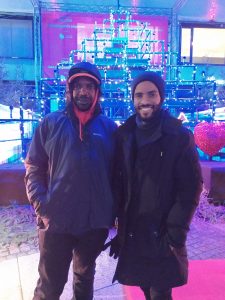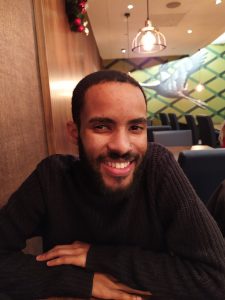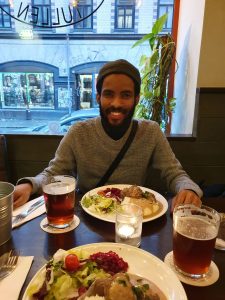Pre-Departure
The pre-departure period started roughly at the start of March 2019, after my application for the exchange had been accepted. What follows, then, is a brief detailing of the process that led up to the actual exchange.
Host University Application
As part of the process, the Linnaeus-Palme exchange programme required me to submit an application. In an essay I had to capture in which ways the exchange experience would enrich both my own research, and that I contribute the academic community in Stellenbosch. A word of advice may be helpful here, in the essay it may prove wise to draw from the insight that you’re present concerned with—doing so illustrates the application of the knowledge you are producing.
On the whole, the entire process takes place online. It is wise to be quite responsive to email correspondence; the liaising administrator will be sending various emails to ease you into the exchange programme—a readiness to respond counts in your favour. Doing so sets you at ease.
Passport and Visa Administration
Following confirmation that the application has been approved, the visa application should take place. At the time of application, I did not yet have a passport, fortunately I applied for one and received it in record time—in less than two weeks.
After this it was essential to start the visa application process. The entire process is online and the SU International Office would be your go-to to sort out the process. Once your application is submitted to the Swedish Embassy, it will be required that you finalise the process in person. This means you will be required to visit the Embassy in Pretoria. The sooner this is done the sooner you will receive communication of its approval. It is strongly advised that you launch this process as soon as you have your passport; I only received communication of approval days before my departure.
Logistics of Arrival
Having noted these administrative processes, a few thoughts on the logistical planning arrival is important. It is highly recommended that you choose to arrive on one of the designated days; on these a service will be available to transport you from the airport to your place of residence. Two respective dates were designated, at the start of my exchange.
In addition to this, the University’s International Office has quite a few programmes planned the week prior to the start of classes. Arriving early, then, allow you the opportunity to get to know not only the city a bit better before classes but also, and perhaps importantly, to meet people that are also international. In all, the pre-departure processes should not cause major problems—throughout this time the international offices of both SU and Gothenburg are your lifelines.

Experience at the Host University
My time in the world’s greenest city, Gothenburg, spanned from late August 2019 to early January 2020. This offered me one hundred and thirty-five days to get to know Swedish culture and education, at least the semblance present in Gothenburg. During this time three things became quite important, which I would learn to cherish and consider important.
Time Management
It is no secret, fundamentally the exchange is educational—the hope is to acquire new and produce new knowledge. This, of course, is not done in isolation or in a vacuum; new knowledge is immersed in the everydayness of life. Coping with the demands of everyday living—ranging from lack of sunlight (getting vitamin D pills is highly recommended) to being homesick to dealing with a breakup and to submission deadlines—requires a balancing act.
Being the committed procrastinator, during the exchange I became good friends with time management. This is for two important reasons. First, I had to complete my master’s thesis by the end of November 2019; having only submitted chapter one by my arrival in Gothenburg. Second, the academic programme was relatively relaxed, classes were every second week; though, this required committed reading of the coursework. In order to meet these deadlines, time management became an abiding friend—here’s the good news, one improves in time; so, don’t stress it.
Be(come) Involved in Community
I am an extrovert; I find joy and strength when around people. Being away from those I know, and love filled me with immense existential dread – and language renders me inarticulate to describe this. Quite soon, in fact immediately, I realised the importance of getting involved in community. How did I do this?
Well, as a good Christian (pause for laughter) and theologian I joined a local church. For those interested, Gothenburg has a rather diverse religious scene—most folks, schooled in Western religious practices, should find a faith community they may be able to call home. More close to home, at my residence in Johanneberg SGS Olofshojd, a weekly event took place that provided an opportunity to meet new people. Be sure to follow the Facebok page GIC Buddies, this should provide much needed information for getting to know the city and its people.
In addition to this, I was quite happy to form part of RFSL Göteborg; an association for LGBTI+ folks. It hosted a weekly coffee meetup at its office on Wednesday at 17H00. To my delight, this provided the opportunity to meet quite a few queer people. Of course, if engagement likes these are uncomfortable; there is the good and faithful Tinder and Grindr.

Cultural Scene
In time I would learn that Gothenburg is the cultural centre of Sweden. Friend be sure to visit the many museums and galleries—they are fairly affordable, and many have a student discount. For book lovers be on the lookout for the Book Fair in mid-September. On the whole Gothenburg provided the perfect space in which to do research, to produce knowledge.
Return to Stellenbosch
Days before my return I was beset with some heavy anxiety, I arrived in South African on 11 January 2020. I had feared that my programme would return to being as busy as it had been prior to my departure—which, of course, was completely different from my experience of Gothenburg, Sweden. I think it helpful to consider three concern when preparing oneself for returning to South Africa and Stellenbosch.
Easing into Busyness
If I could give myself advice prior to returning, it would be to hold off on meeting too many people. My first few weeks were immersed in coffee meetups, wine tastings and so many other social engagements. Of course, retrospectively, these many encounters drained me immensely. I, therefore, think it quite important to ease one into the busyness of Stellenbosch.
Planning my return, it was pushed forward by an international conference I had participated in—I had presented a paper on my master’s thesis research. Weeks after my return classes would start and I was appointed a tutor, add to this finalising my master’s degree (with the defence looming). Also, ‘reverse culture shock’ is definite a thing! It took me quite a few days to realise that I was not in Gothenburg, but in Cape Town—with all the dangers that come with inhabiting this space as a queer person.
Tying Up Loose Ends, and the Way Forward
Part of my return, as stated, was drawing my master’s degree to close—the thesis had just been submitted at the end of November, the defense was looming, and I participated in a conference. The best advice, I think, would be to return mindful of that which needs attention upon arrival; for me this was defense preparation and readying myself for tutoring.
Returning also meant I would have to finalize what 2020 would hold for me. While in Gothenburg I had unsuccessfully applied for funding for a PhD programme. Returning, then, required a plan of action, especially at the start of a new year. The tying up of loose ends, therefore, must include formulating a plan forward when one is completing a degree mid-exchange.

Rest
This, then, brings me to the third idea I think essential upon return. Rest is essential! This cannot be overstated. Only weeks later, by mid-March, I had felt the lethargy of being overly productive without centering and prioritizing my body’s limitations. I think it wise to allow oneself the grace of at least a week or two of little social engagements, to come to terms with the change in geography and reorient oneself—this is especially crucial at the start of a new academic year.
The temptation, of course, is to think that fun activities—a wine tasting here, a kuier there—will not contribute to one’s tiring. But, this I learned, is not true. Being around people can be profoundly enriching while also immensely draining. This, no doubt, is exacerbated by the fact that they have not seen you in some time and would love to hear about your experience. Please prioritize rest, friend.

